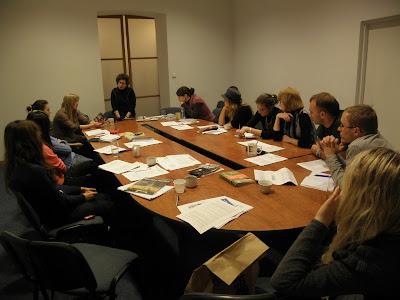@ctivation.pl is Humanity in Action Poland’s first educational program on national and ethnic minorities, and is open to participants from Poland, Ukraine, Belarus and Lithuania. It strives to deepen participants’ knowledge with the help of an on-line course and a study trip to Poland. Specifically, the goal of the workshop is to provide the theoretical and practical background necessary for successful implementation of action projects.
The on-line course, which took place from September to November 2010, was divided thematically into six levels. The aim was to explore the impact of ethnicity, religion and language as they pertain to the infringement of minority rights. Furthermore, the course focused on international mechanisms guaranteeing the rights of people belonging to national and ethnic minorities, and international and national actors responsible for defense and protection of human rights. Finally, as individuals can also bring about a change, the course provided participants with the tools they need to implement their individual projects to the highest possible standards.
Another intention of the project was to facilitate contacts between these young leaders, and to allow them share their experiences and learn from the experiences of mentors, experts and activists. On-line forums and face-to-face meetings were both used.
The study trip in Warsaw, „Patchwork: Deconstructing Homogeneity of the Polish Society” which took place from December 5th to 12th 2010 corresponded thematically to the on-line course. The project participants examined the situation of the national and ethnic minorities in Poland and got to know something about the best practices in the field of human rights protection and education. The participants were offered tailor-made training for implementing their projects received individual counseling to enhance practical skills related to project management and fundraising. The project team responsible for creating and conducting the program was: Monika Mazur-Rafał, President of the Foundation HIA PL and Program Director; Magda Szarota, HIA PL Managing Board Member and HIA Program Coordinator and Yulia Gogol, @ctivation.pl Coordinator.
Throughout the project, @ctivation.pl’s participants had the chance to learn from and network with representatives of the following organizations: Amnesty International, Association of Ukrainians in Poland, Common Council of Catholics and Muslims, Education for Democracy Foundation, Helsinki Foundation for Human Rights, Human Rights Defender Office, Information Office in Poland/European Parliament, Humanity in Action Poland Senior Fellows’ Network, Open Republic Association Against Anti-Semitism and Xenophobia, Organization for Security and Co-operation/Office for Democratic Institutions and Human Rights, Polish Council of Christians and Jews, Polish-Ukrainian Cooperation Foundation PAUCI, Representation of the European Commission in Poland.
Newly inspired, and filled with ideas, the project participants have approximately five months to implement their action projects on national and ethnic minorities in their respective communities. HIA Poland will be assisting them in this process.
Moreover, HIA PL and PZU Foundation have created a joint grant competition for the best action project (to read more about it, click here)


























